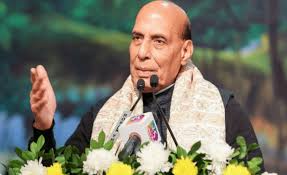Pakistan should seek India’s help if it can’t deal with terror on its soil: Rajnath Singh in Dehradun

Dehradun, June 10, 2025 – Defence Minister Rajnath Singh, during a public rally in Dehradun, delivered a strong statement against Pakistan. He accused the country of nurturing terrorism and said Pakistan should ask India for help if it cannot control extremists on its soil. His comments followed the United Nations Security Council’s controversial move to make Pakistan vice-chair of its Counter-Terrorism Committee.
“Cat guarding the milk” – A swipe at the UN
Rajnath Singh criticized the UN for trusting Pakistan with a leadership role in global counter-terrorism. “Appointing Pakistan to a counter-terror panel is like asking a cat to guard the milk,” he said, drawing loud applause.
He questioned how a nation accused of sheltering terrorists could lead efforts to fight them. He urged the international community to act more responsibly and avoid undermining its credibility.
Operation Sindoor: India’s example of decisive action
Singh praised India’s recent military mission—Operation Sindoor, carried out in May. The strike targeted and dismantled multiple terror bases in Pakistan-occupied Kashmir (PoK). He described it as one of India’s most effective counter-terror operations.
He said the action proved that India doesn’t wait for threats to cross its borders. Instead, the nation acts at the source of the danger. Singh called this approach a reflection of India’s strength and determination.
“If Pakistan can’t handle terror, ask us for help”
Rajnath Singh made a pointed remark: “If Pakistan can’t eliminate terror groups within its territory, it should seek India’s help. We are capable, and we’ve shown it.”
Though the offer sounded sarcastic, it also reflected India’s growing confidence. He implied that India not only defends itself but could assist others if they were sincere about fighting terrorism.
Reaffirming India’s stance on PoK
The minister also repeated India’s claim over Pakistan-occupied Kashmir. He said, “PoK was, is, and will always be part of Bharat.” According to him, it’s not just a constitutional matter, but the dream of every Indian.
Singh’s message matched India’s current foreign policy, which is more assertive than in the past. His remarks followed rising tensions and frequent skirmishes in the region.
India, the Mother of Democracy; Pakistan, the Father of Terror
Singh drew a sharp contrast between the two nations. He said India is the “Mother of Democracy,” while Pakistan is the “Father of Global Terrorism.”
This framing underscored India’s efforts to shape its international image. As a democracy and growing global player, India is keen to show that it stands for peace and progress. By comparison, Singh painted Pakistan as a destabilizing force.
This narrative is important as India pushes for a permanent seat on the UN Security Council. It also leads G20 initiatives and expands its diplomatic presence worldwide.
Fighting fake news and media’s role
Singh also warned about misinformation, especially during military operations. He said that during Operation Sindoor, Pakistan spread false claims to mislead the public.
He asked people to become “social soldiers” and avoid spreading unverified content. “Check facts before sharing. The digital war is real, and truth must win,” he said.
Singh also appealed to journalists. He encouraged them to focus on accuracy and national interest over sensational headlines. “When soldiers risk their lives, we must support them with truth,” he added.
Global implications of Singh’s message
His remarks came at a time when more countries are losing patience with Pakistan. While the UNSC appointment sparked controversy, many Western nations have criticized Pakistan’s double standards on terrorism.
Singh’s speech, though sharp, offered a way forward. By offering help to Pakistan—despite their history—India showed its maturity. But Singh made it clear: India will not tolerate excuses or hypocrisy.
The world is watching. Singh’s statement was not just meant for Pakistan, but also for global bodies that continue to ignore its role in harboring terror groups.
India’s evolving security strategy
Singh’s speech showed how India’s security strategy is changing. India is no longer reactive. It now takes the fight to the source of threats. This shift marks a new phase in Indian defense policy.
India has also increased domestic defense production and exports. The country aims to become self-reliant and reduce dependence on foreign weapons.
He highlighted these efforts, saying India now builds not just for itself, but also for global partners. This new confidence underlines a larger vision: a secure India that contributes to global peace.
Conclusion
Rajnath Singh’s address in Dehradun was a powerful mix of criticism, confidence, and challenge. He slammed Pakistan’s role in global terror and questioned international bodies for enabling it. At the same time, he offered a bold solution: if Pakistan can’t fight terror alone, India is ready to help.
His speech outlined India’s growing role in global security. It also made clear that India would no longer stay silent or passive. With Operation Sindoor, a stronger defense sector, and diplomatic assertiveness, India is setting the tone for how modern democracies must act against terrorism.
As tensions in South Asia continue, Singh’s words may well mark a turning point in how India—and the world—handles terrorism going forward.






